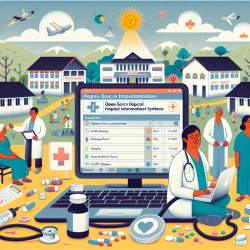Embracing Mindfulness in Medical Education: A Path to Better Clinical Outcomes
In the fast-paced world of medical education, the concept of mindfulness has emerged as a transformative tool for enhancing clinical practice. According to a recent commentary by Ronald M. Epstein, published in Perspectives on Medical Education, mindfulness is not just a trendy buzzword but a dynamic practice that can significantly impact medical training and practice.
What is Mindfulness?
Mindfulness in medical education is more than a mere technique; it is a practice of non-judgmental attention to oneself and others in the moment. It involves acting with clarity, resolve, compassion, and practical wisdom. This approach is crucial in handling the complexities and uncertainties of medical practice, especially in high-pressure situations like emergency responses or difficult patient interactions.
Why Mindfulness Matters in Clinical Practice
The integration of mindfulness into medical education addresses several critical areas:
- Empathy and Communication: Mindfulness enhances empathy and communication skills, essential for patient-centered care. It allows practitioners to engage more effectively with patients, fostering trust and understanding.
- Clinical Decision-Making: By promoting a state of presence and curiosity, mindfulness helps practitioners make informed decisions, even in complex and ambiguous situations.
- Well-being and Self-awareness: Mindfulness practices contribute to the well-being of medical practitioners by reducing stress and burnout, thereby improving overall job satisfaction and performance.
Implementing Mindfulness in Medical Education
To effectively integrate mindfulness into medical training, educators must focus on creating an environment that nurtures these skills. This involves:
- Curriculum Design: Programs should include mindfulness as a core component, emphasizing its role in enhancing clinical effectiveness.
- Faculty Development: Educators themselves must embody mindfulness, serving as role models for students. Ongoing training and mentoring are crucial for sustaining these practices.
- Assessment and Feedback: While validated scales of mindfulness exist, careful observation and feedback are essential to ensure that students apply these skills appropriately and ethically.
Challenges and Opportunities
While the benefits of mindfulness are clear, implementing these practices in medical education is not without challenges. Educators must be cautious not to overpromise the outcomes of mindfulness training. Instead, they should focus on fostering a community of practice where mindfulness is a shared value among practitioners.
Programs like those at McGill University and the University of Rochester serve as valuable models, demonstrating the potential of mindfulness to create a more empathetic, effective, and resilient healthcare workforce.
For practitioners looking to enhance their skills, mindfulness offers a pathway to improved clinical practice and personal well-being. By embracing mindfulness, medical professionals can navigate the complexities of their work with greater clarity and compassion.
To read the original research paper, please follow this link: Mindfulness in medical education: coming of age.










